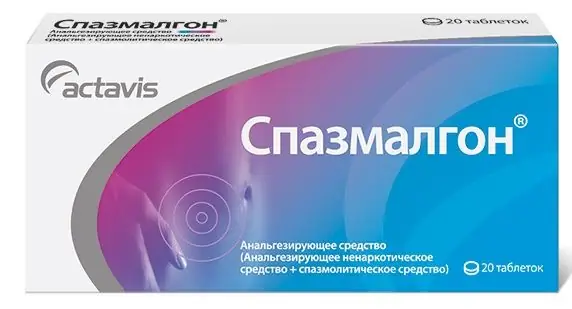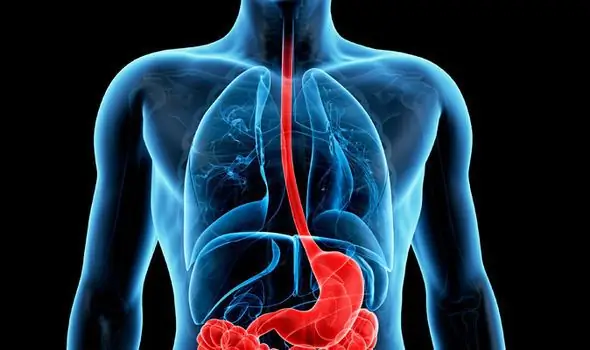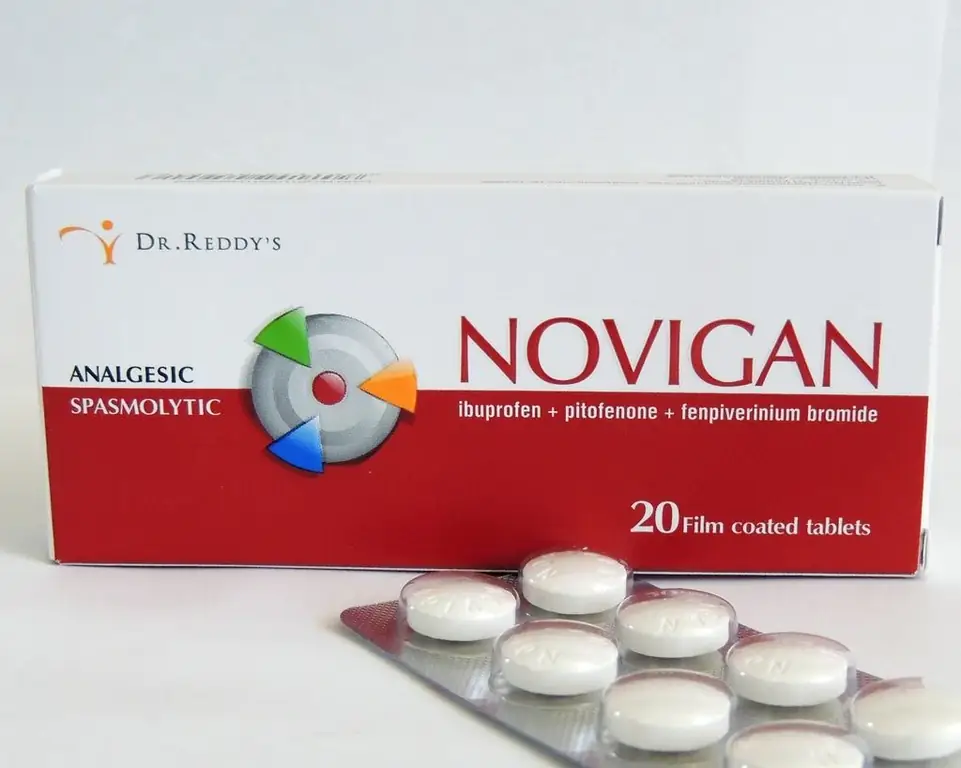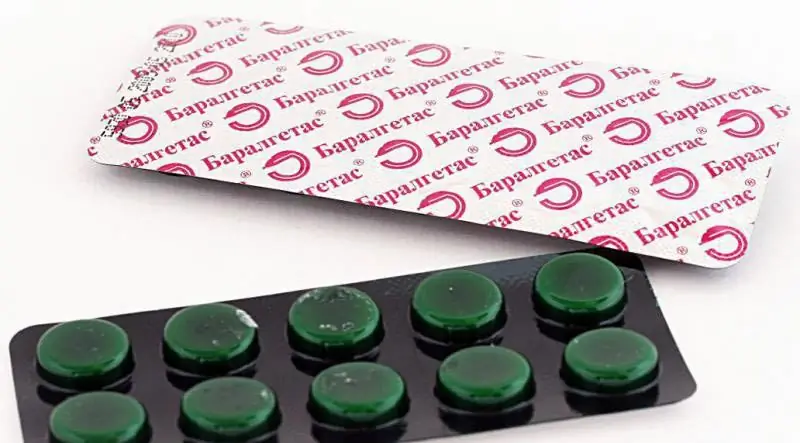- Author Curtis Blomfield blomfield@medicinehelpful.com.
- Public 2023-12-16 20:44.
- Last modified 2025-01-23 17:01.
Many modern drugs contain such a component as fenpiverinium bromide. This substance has a lot of useful properties, it can relieve spasm and eliminate pain. Naturally, many people are looking for additional information about this tool. For example, it is no secret to anyone that this substance is part of such drugs as Novospazm and Spazmalgon.

What does this component help with? How does it affect the body? Are there any contraindications? Can there be any complications during therapy? The answers to these questions are important.
General information
Many anticholinergic and vegetotropic drugs contain this particular component. By the way, they are available in the form of tablets and solutions and are used in a variety of situations. The full chemical name is 1-(3-carbamoyl-3, 3-diphenylpropyl)-1-methylpiperidinium bromide.
Fenpiverinium bromide: pharmacological properties
Of course, it is worth familiarizing yourself with the basic properties of the substance. So, what effect does fenpiverinium bromide have? This substance has m-anticholinergic propertiesand has a myotropic effect on smooth muscles of internal organs, vessel walls, etc.
Studies have shown that Fenpiverinii bromidum is quickly absorbed by the walls of the digestive tract after oral administration. The maximum concentration of this substance in the blood is observed after about an hour, although the first effect appears after a few minutes.

It is worth noting that this component of various drugs does not pass through the blood-brain barrier, so it does not have a serious effect on the central nervous system. The substance is processed by liver cells. Most of fenpiverinium and its metabolites are excreted by the kidneys (part of the substance penetrates into the bile and, accordingly, the digestive system). The elimination half-life is 10 hours.
What drugs contain fenpiverinium bromide? Analogues, combination products
Immediately it should be said that this substance is not used in its pure form - it is the active component of many combined drugs along with other chemical compounds.
- To begin with, we note that fenpiverinium is part of the widely used drug Spasmalgon. What does the drug help? It perfectly copes with the pain syndrome caused by spasms of smooth muscles. By the way, it also contains other active ingredients, including pitofenone and metamizole sodium. Other medicines have the same composition: Spazmaton, Maksigal, Bralangin, Trinalgin, Revalgin, Spazgan, I took.
- Drugs such as Novospazm, Novigan and Spazgan Neo contain fenpiverinium bromide, as well as pitofenone and ibuprofen. The drugs not only quickly eliminate the spasm, but also have anti-inflammatory properties.

Main indications for use
Fenpiverinium bromide as part of various combined preparations is used in many cases:
- With mild or moderate pain syndrome, which is associated with spasm of the smooth muscles of the internal organs. Indications include spasm of the bladder and ureter, biliary, renal and intestinal colic, chronic colitis, various diseases of the pelvic organs, biliary dyskinesia, algomenorrhea.
- As part of complex therapy, such drugs are used for myalgia, neuralgia, as well as sciatica and arthralgia.
- Drugs with the above component are used to eliminate pain after various diagnostic procedures and surgical interventions.
How to take medicine?
How to take fenpiverinium bromide? Instructions for use directly depends on which combination medicine a person takes. For example, if we are talking about the use of the drug "Spasmalgon", then patients are recommended to take 1-2 tablets about 2-3 times a day (it all depends on the severity of the pain syndrome). But in the case of Bralangin, a single dose is 2 tablets (patients usually take the medicine four times a day).

It is worth noting that if we are talking about long-term use of fenpiverinium bromide (more than seven days), then it is extremely important to monitor the functioning of the liver and changes in peripheral blood.
Contraindications
Despite the fact that drugs with this component are sold without a prescription, they are not always safe, especially if the patient has contraindications:
- hypersensitivity (before starting therapy, it is worth studying the full composition of the selected medication, since allergies can also develop when auxiliary components enter the body);
- severe renal failure;
- severe liver failure;
- violation of hematopoietic processes in the bone marrow;
- collapse;
- certain diseases of the circulatory system, including severe forms of angina pectoris, tachyarrhythmia, as well as decompensated forms of heart failure;
- intestinal obstruction regardless of origin;
- prostate hyperplasia (if there are clinical manifestations of pathology);
- angle-closure glaucoma;
- pregnancy and breastfeeding period.

There are also age restrictions on the use of this substance, but in this case it all depends on the type of drug taken, the form of release and other factors.
Are there possible complications during therapy?
Is it safe to take medicines containing fenpiverinium bromide?The official instructions and the results of scientific studies indicate that the appearance of complications during therapy is possible. The list of adverse reactions is quite impressive:
- Visual and nervous system disorders may occur. For example, some patients complain of headaches and frequent dizziness. Possible disturbance and paresis of accommodation, various visual disturbances.
- There is a possibility of disorders in the functioning of the cardiovascular system. Side effects include palpitations, tachycardia, low blood pressure, flushing, and cyanosis.
- It is possible to develop agranulocytosis during therapy. Such a pathology is accompanied by a rapid, inexplicable increase in body temperature, chills, sore throat, problems with swallowing, the development of stomatitis, vaginitis, proctitis.
- Sometimes there is a violation of the digestive system. This is accompanied by vomiting (sometimes with blood impurities), constipation and other stool disorders, dry mouth, pain and discomfort in the abdomen, burning in the stomach. More serious complications include exacerbation of existing gastritis, the formation of ulcers on the mucous membrane, bleeding in the intestines.
- The substance may cause effects on the respiratory system, sometimes resulting in bronchospasm.
- Therapy sometimes affects the organs of the genitourinary system. Some patients complain of urinary retention, problems with urination. Anuria, proteinuria, polyuria develop. More severe complications include functional disorders withside of the kidney, the development of interstitial nephritis.
- Allergic reactions are also possible. The most common is urticaria, in which the rash appears not only on the skin, but also on the conjunctiva and mucous tissues of the nasopharynx. There is a risk of developing malignant exudative erythema, as well as toxic epidermal necrolysis. Some patients develop angioedema, anaphylactic shock after taking the medicine.
- Other complications include reduced sweat secretion and asthenia.
- When it comes to intravenous or intramuscular injection, pain, redness, swelling at the injection site is possible.

Of course, complications are rare. But if you notice any deterioration in yourself, you should stop taking the pills (or other dosage forms) immediately and see a doctor.
Overdose information
When using too much fenpiverinium bromide, various complications may occur. Overdose patients complain of severe abdominal pain, nausea, and tinnitus. There is hypothermia, severe shortness of breath, a sharp decrease in blood pressure, as well as drowsiness and impaired consciousness, sometimes up to delirium. In more severe cases, taking a large amount of the drug is associated with convulsions, the development of acute renal and hepatic failure, and paralysis of the respiratory muscles. Treatment in this case is symptomatic. First, the patient is washedstomach, after which sorbents are introduced. In severe cases, the patient requires hemodialysis. With convulsions, the use of "Diazepam" is possible.
Additional information
It is worth saying that this substance in one way or another affects the speed of psychomotor reactions and the ability to concentrate. This information should be taken into account, for example, by drivers, as well as people who work with equipment that requires a quick response.

As for drug interactions, fenpiverinium bromide should not be taken simultaneously with phenothiazine, tricyclic antidepressants, quinidine, butyrophenones, as this enhances its m-anticholinergic effect.






